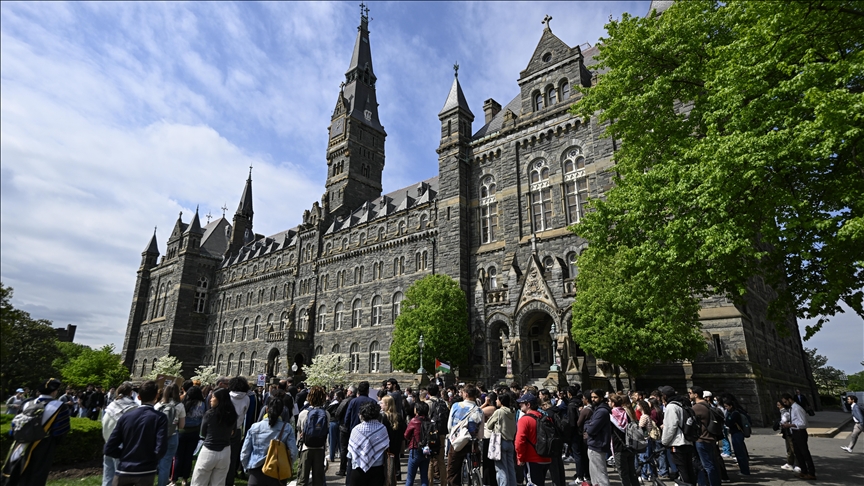Georgetown joins Columbia, Tufts in vigil for detained scholars, students critical of Israel
‘In the United States, we now have political prisoners,’ says Georgetown professor
 File Photo - Georgetown University students take part in a campus protest against the ongoing Israeli attacks on Gaza in Washington, D.C., United States on April 25, 2024
File Photo - Georgetown University students take part in a campus protest against the ongoing Israeli attacks on Gaza in Washington, D.C., United States on April 25, 2024
WASHINGTON
Faculty and staff at Georgetown University in Washington, DC gathered on campus Monday to demand the release of students and scholars being held in US immigration detention facilities after speaking out against Israel’s devastating war on Gaza.
The vigil, held in Red Square outside Georgetown’s Intercultural Center, was part of a coordinated campus protest also taking place at Columbia and Tufts universities.
The weekly protest calls for the release of Badar Khan Suri, an Indian postdoctoral researcher at Georgetown; Mahmoud Khalil, a Palestinian activist and recent Columbia graduate; and Rumeysa Ozturk, a Tufts PhD student from Türkiye.
All three were detained in March and face no criminal charges. The Trump administration has accused them of supporting the Palestinian group Hamas and engaging in antisemitism, but no evidence has been provided to support those claims.
Supporters say their arrests are politically motivated and part of an effort to silence dissent against Israel’s genocidal war on Gaza, which killed more than 52,500 Palestinians since October 2023.
On March 17, Khan Suri was picked up by masked agents from the Department of Homeland Security outside his home in Virginia. In the days that followed, he was moved across five facilities in three states before arriving at a detention center in Texas, where he remains.
Nader Hashemi, a professor of Middle East politics at Georgetown and director of the university’s Alwaleed Center for Muslim-Christian Understanding, went to Texas to visit him in detention.
“He told me about his prison conditions— how horrific they were. He told me that he is known as Gandhi in the prison because he's from India and is teaching his fellow cellmates about the political ideas of Mahatma Gandhi,” Hashemi told Anadolu.
Hashemi said Suri is being held in a maximum-security facility, forced to wear a red uniform showing restricted privileges. “He told me he gets only two hours of fresh air per week.”
Despite the harsh conditions, Hashemi said Suri remains defiant.
“He said if his arrest and his family's suffering can reveal the naked authoritarianism of the Trump regime and keep the spotlight on the genocide in Gaza, his suffering will be worth it…I left very much inspired by that visit.”
Hashemi emphasized that all three detained scholars should be recognized as political prisoners.
“In the United States, we now have political prisoners. So basically, we are the moral equivalent of (President Vladimir) Putin's Russia, of other authoritarian regimes,” he said, adding that the recent arrests are “directly connected” to the decline of democracy in the US.
“The Trump administration now is effectively acting as a lawyer for (Israeli Prime Minister) Benjamin Netanyahu and his supporters here in this country, who don't want any discussion, any dissent, any freedom of expression when it comes to the question of Israel-Palestine,” he added.
Growing fear on campus
Also attending the vigil was Elliott Colla, associate professor in Georgetown’s Department of Arabic and Islamic Studies.
“I am here today because the Trump regime abducted one of my colleagues, Dr. Badar Khan Suri. They took him off the street in an illegal act,” he said. “If they can do it to him, they can do it to any one of us.”
Colla described an atmosphere of growing fear on campus, especially among international students and faculty.
“I've never experienced so much fear in my community,” he told Anadolu. “Many of my students, many of my colleagues, many of my neighbors were not born in the United States. They're here with different statuses. Some of them are US citizens. Some of them have green cards. Some of them are here on student visas.”
“Right now, they're going after people who have different immigration statuses or visa statuses, and they're doing it in a very openly, brazen, illegal manner. But the point is clear: they want to try to shut down political dissent.”
The Georgetown vigil was part of a coordinated action alongside similar events at Columbia and Tufts, where supporters held up photos of the three detained scholars.
Inspired by the Mothers of the Plaza de Mayo and other global movements against enforced disappearances, organizers say they will continue gathering every Monday until Khalil, Ozturk and Suri are released.








